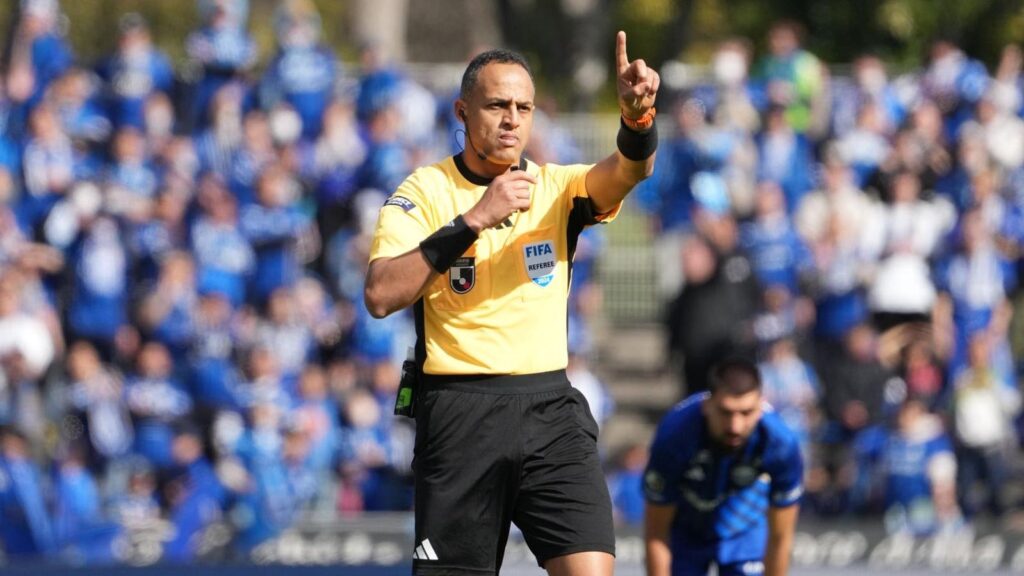American referee Ismail Elfath was the first MLS referee to revise a call via video review, commonly … [+] known as VAR.
Getty Images
On Thursday, the 20 clubs of the English Premier League reportedly voted overwhelmingly to continue using video review — known colloquially as VAR — in its league matches.
While the vote preserves the use of replay to help officiate matches, it by no means affirms any popularity of the technology among popular among Premier League Supporters. In fact, the chairman of the Football Supporters’ Association recently told AFP that 2 of 3 fans are against its use.
That hostility in England doesn’t exist everywhere. Take MLS, which exists in an American sports culture that has long embraced video review — replay review as it is often called there — in its other major sports. While the technology is not immune from controversy, most MLS fans generally think the use of VAR has been more good than bad.
Part of that sentiment is based on exactly how MLS has implemented VAR, a thought process the Premier League should consider trying to mimic. And that may be pretty likely. It was former Premier League referee Howard Webb who guided MLS’ early implementation of the technology, and who assumed the top managerial role at the Professional Game Match Officials Limted last March.
Here’s three ways the Premier League should lift directly from MLS to improve the popularity of replay review among supporters, players and managers.
1) Eliminate Additional Offsides Technology
Arguably the most frequent source of frustration with replay in the Premier League has come via fractional offside decisions that owe to use of the virtual offside line.
A change is already coming on that front, with the league set to adopt semi-automatic offsides review that is already used in the UEFA
iShares MSCI EAFE ETF
Champions League and was first implemented at the 2022 FIFA World Cup.
But MLS takes a more low-tech approach. There is neither virtual offsides lines nor semi-automatic technology. If a referee can’t definitively reverse an assistant referee’s decision based only on replay angles, then the assistant referee’s decision stands.
This is actually preferable because of the spirit in which the offside law was written. The infraction was always meant as something players could discern with a naked eye, rather than to punish gaps of millimeters only distinguishable via multiple camera angles. The MLS approach is more in accordance with that spirit.
2) All Final Decisions From Head Referee
One reason many of the Premier League’s video reviews feel so hostile is that the final decision often comes directly from the video assistant referee, who is out of sight of fans at the stadium and watching on television.
It works differently in MLS, where the head referee is called far more frequently to review decisions pitch side on a monitor, and in the overwhelming majority of circumstances is the person making the final decision.
While this does sometimes result in a longer delay, it also perhaps subconsciously raises the standard for what plays should be reviewed. And it gives players and coaches of the impacted teams more direct access to an explanation from the final decision maker.
3) Detailed Public Address Explanations
Premier League clubs have already given approval for referees to explain their replay review decisions over the public address system beginning next season.
But the league should look to MLS for an example of exactly how to do this, after MLS also adapted the practice earlier this season.
What’s important is that referees use their microphone to explain — albeit briefly — exactly what the contributing factor was to either change or retain their decision. This is something MLS officials have done well, and it is particularly helpful to fans in the stadium who don’t necessarily have access to lots to replays the TV audience sees.
That wasn’t the case when audible explanations were first introduced at the 2023 FIFA Women’s World Cup. In many cases, match officials simply announced what decision had been reached, while leaving out the why. It was redundant information that most fans would’ve already known from the referees’ hand signals.
>>> Read full article>>>
Copyright for syndicated content belongs to the linked Source : Forbes – https://www.forbes.com/sites/ianquillen/2024/06/08/after-vote-premier-league-should-adopt-these-3-mls-var-practices
